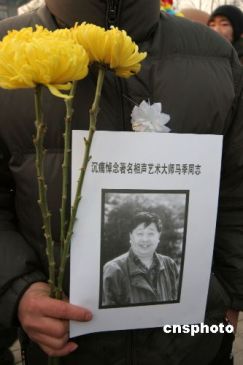Prominent crosstalk master gone with tears and laughs
时间:2006-12-25 03:07:30
(单词翻译:单击)

| A local resident holds a portrait of Crosstalk Master Ma Ji outside the mourning hall, Dec. 24, 2006. The funeral for Ma was held on Sunday morning in Babaoshan Cemetery1 in Beijing. Ma died from heart attack at age of 72 in a Beijing hospital on Wednesday morning. |
| Dec. 25 - Ma Ji, a well-known Chinese crosstalk master, will never imagine so many tearful eyes around him, as he always drew peals2 of laughter from people wherever he was.
Ma, who died of heart disease at the age of 72 in a hospital in Beijing last Wednesday, was cremated3 at the city's Babaoshan Cemetery on Sunday. Early at dawn, hundreds of people already gathered in front of the gate of the cemetery. Grandpa Liu, 73, got up at 5:00 a.m. so as not to miss the chance to bid farewell to his favorite performer. "I have listened to his Xiangsheng (crosstalk or comic dialogue) for my whole life. I must come to see him off. It's the last chance," Liu said. People started to flock in after the gate was opened. Some took photos of the condolence banners hung on the trees, some stood in silent tribute to the photo of the deceased, and some were placing their wreaths. Grey-haired Cao Wenhan, a retired4 teacher from Beijing Normal University, came with his hand-made show board, which displayed 20photos taken a decade ago when Ma Ji was giving a report at the campus. "He is not only a great performer, but also a good man. He was always willing to satisfy others' demands, but seldom asked for something from others," Cao said. By the time the hearse carrying Ma's body arrived, more than 1,000 people had assembled on the square in front of the mourning hall. They swarmed5 toward the carriage side, arousing a small surge after a long solemnity. Many elderly people shed tears. "Please don't push and get into lines! Your feelings are understandable, but please!" a female staff member yelled, eyes brimmed over with tears. People then gradually stood in lines and queued to sign their names on a commemoration book. Chen Guoyue, who suffered serious eyesight weakness, wrote the names of him and his friend in egg size, with his face so close to the paper as if they were stuck together. "I have grown up with listening to his Xiangsheng. So many times have I listened that I can repeat some," Chen said. Though not sure to say he hadn't missed any of Ma's comic dialogues, Chen was confident that he had covered at least 100. Heeven performed one of Ma's comic dialogues titled "Pulling out teeth". Those endless laughs were still touching6 him today. "Ma Lao (Old Ma, a call to show respect) left us, together with laughs of a generation," Chen said. Ma, born in 1934 in Beijing, began to learn Xiangsheng at the age of 17. He is regarded as an artist who combines the traditional with modern crosstalk art forms. His works reflected every-day life in China. Ma was good at satirizing7 social problems and praising heroes. He created more than 100 pieces of crosstalk works and published a number of books on crosstalk. His departure also triggered worries over the ebb8 of the traditional art with thousands of years of history. "I don't know whether we will have another Xiangsheng performer so persistent9 like him in the future," said sculptor10 Wen Yongli, who had worked day and night to devote a bust11 of Ma to the funeral. "I want to tell him that we will never forget him," he added. A blogger named "Bangbang" wrote on the Internet that he liked the comic dialogues of Xiangsheng masters like Ma Sanli, Ma Ji andJiang Kun very much. "But I witnessed the decline of Xiangsheng, and haven't listened to it for many years," he said. "Another master has left us. I don't know when Xiangsheng can revive in China," he added. Xiangsheng, a "language art", combines four basic techniques: speech, mimicry12, comedy and song. Xiangsheng can be performed by one person or more, but the most common form is two persons. It dates back to the Spring and Autumn period (770-476 BC) and the Warring States (475-221 BC) when professional entertainers were first recorded. |
点击 收听单词发音
收听单词发音
 收听单词发音
收听单词发音
1
cemetery

|
|
| n.坟墓,墓地,坟场 | |
参考例句: |
|
|
|
2
peals

|
|
| n.(声音大而持续或重复的)洪亮的响声( peal的名词复数 );隆隆声;洪亮的钟声;钟乐v.(使)(钟等)鸣响,(雷等)发出隆隆声( peal的第三人称单数 ) | |
参考例句: |
|
|
|
3
cremated

|
|
| v.火葬,火化(尸体)( cremate的过去式和过去分词 ) | |
参考例句: |
|
|
|
4
retired

|
|
| adj.隐退的,退休的,退役的 | |
参考例句: |
|
|
|
5
swarmed

|
|
| 密集( swarm的过去式和过去分词 ); 云集; 成群地移动; 蜜蜂或其他飞行昆虫成群地飞来飞去 | |
参考例句: |
|
|
|
6
touching

|
|
| adj.动人的,使人感伤的 | |
参考例句: |
|
|
|
7
satirizing

|
|
| v.讽刺,讥讽( satirize的现在分词 ) | |
参考例句: |
|
|
|
8
ebb

|
|
| vi.衰退,减退;n.处于低潮,处于衰退状态 | |
参考例句: |
|
|
|
9
persistent

|
|
| adj.坚持不懈的,执意的;持续的 | |
参考例句: |
|
|
|
10
sculptor

|
|
| n.雕刻家,雕刻家 | |
参考例句: |
|
|
|
11
bust

|
|
| vt.打破;vi.爆裂;n.半身像;胸部 | |
参考例句: |
|
|
|
12
mimicry

|
|
| n.(生物)拟态,模仿 | |
参考例句: |
|
|
|
- 上一篇:China unveils anti-AIDS education project for students
- 下一篇:Pope issues Christmas call to protect children
©2005-2010英文阅读网




